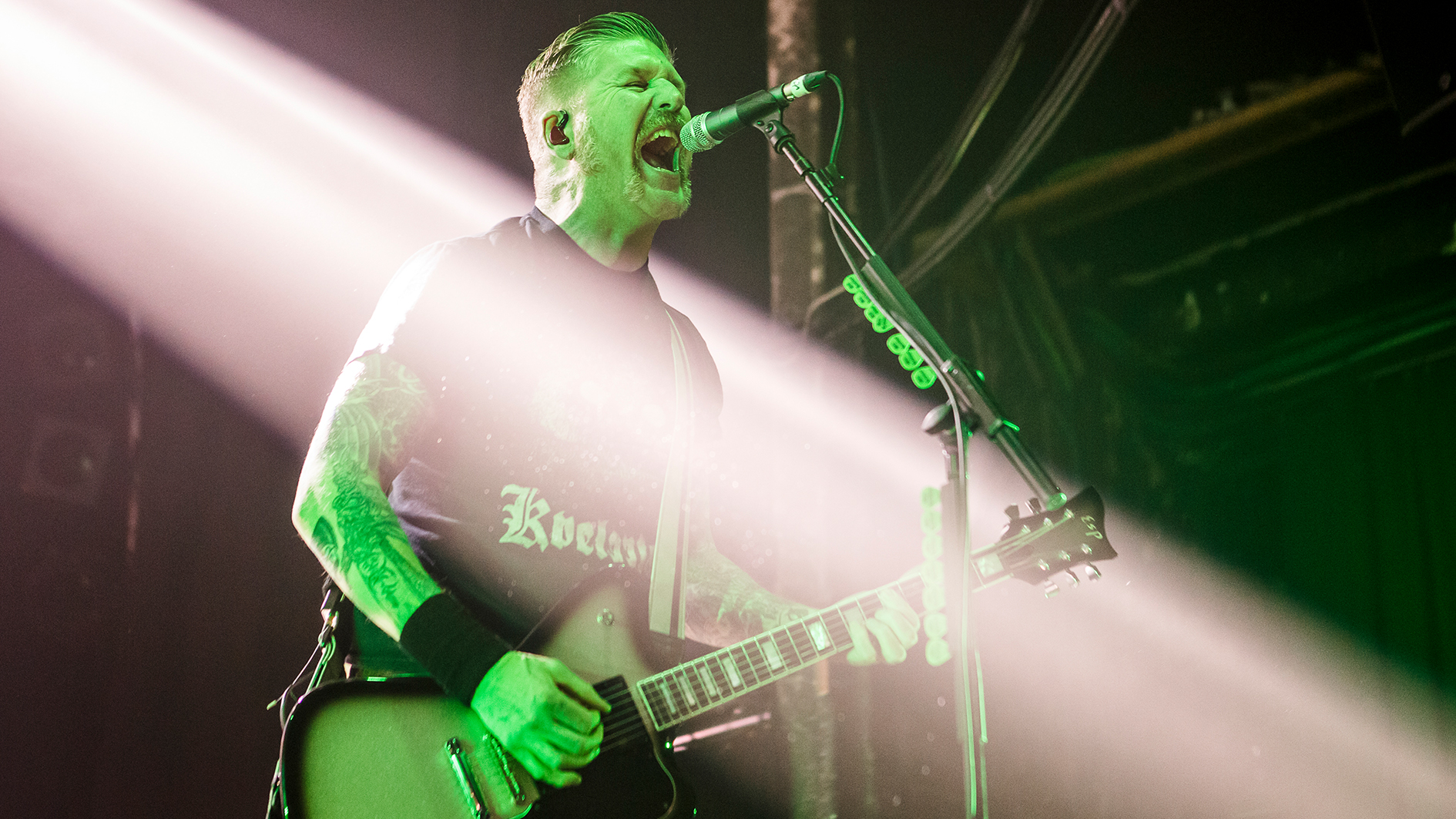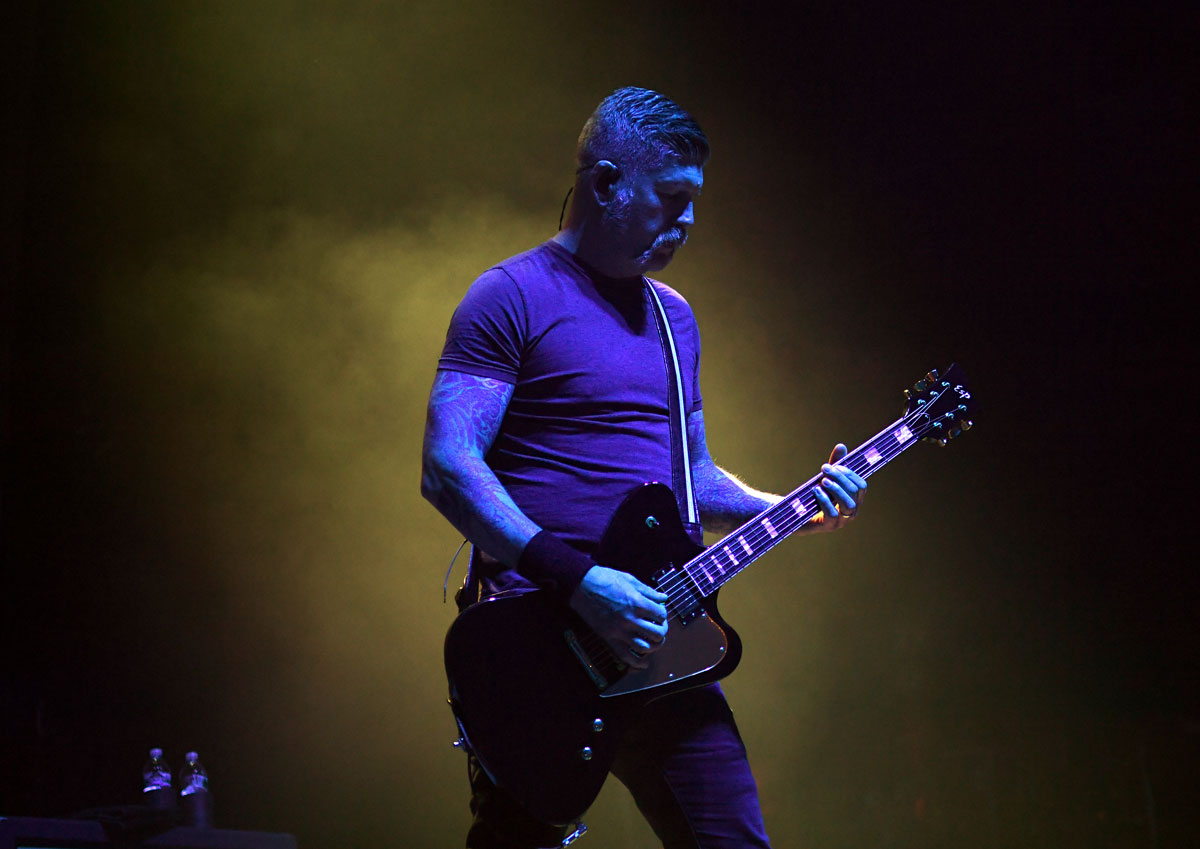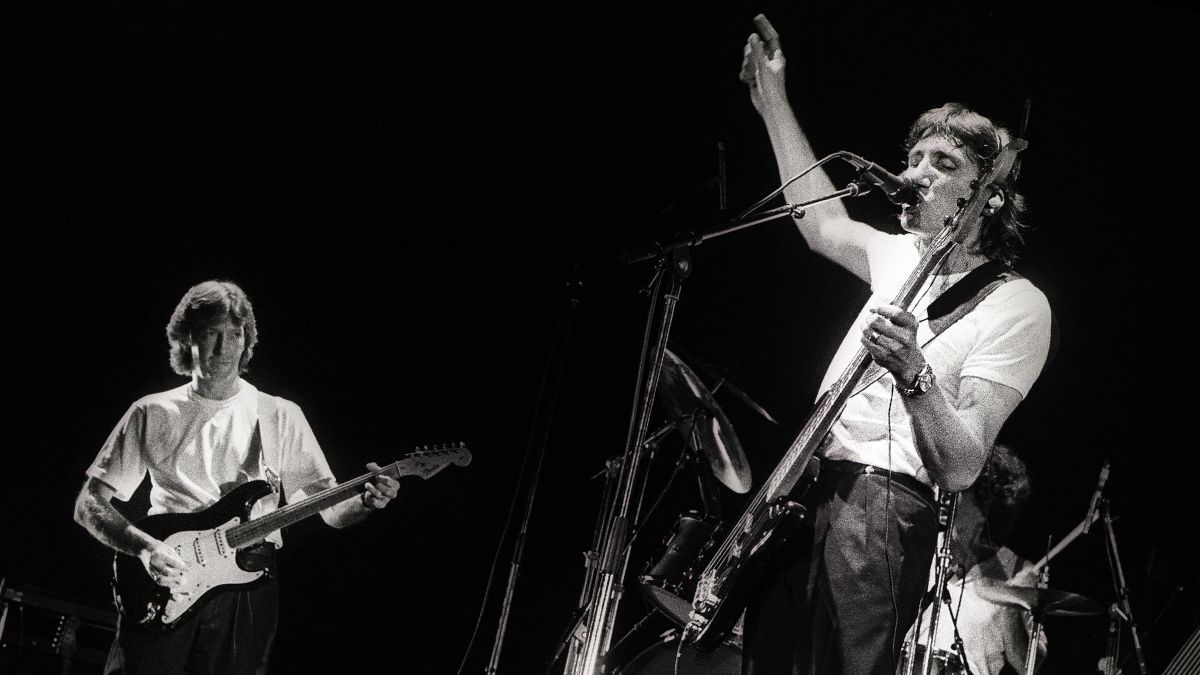Bill Kelliher: “Metallica practiced for three hours a night before playing onstage for another two. Meanwhile, we were sitting around drinking beer and picking our noses!”
The Mastodon guitarist reveals what he learned from touring with the biggest metal band in the world, and shares his thoughts on The Black Album, 30 years on

As part of Guitar World's cover story celebrating the 30th anniversary of The Black Album, we spoke to some key players whose lives had been changed by Metallica’s self-titled 1991 opus.
One of those musicians was Mastodon’s Bill Kelliher, then just 20 years old and already a fully fledged ‘Tallica fan when the metal masters released album number five.
As he explains, their stylistic shift from longer, almost progressive orchestrations to something more sonically direct and urgent took a little while to process at first. It was, after all, a new side to Metallica – with bigger hooks and stronger melodies to counterpoint their signature thrash aggression, and shorter songs compared with its predecessors.
It didn’t take long, however, for Kelliher to realize the true greatness encased in its 12 genre-defining tracks, which saw the four horsemen taking cues from bands like Soundgarden in search of “the ultimate bouncy riff” and consequently pervading the mainstream in ways that heavy metal had never dared to before.
Nearly two decades later, Mastodon would be invited to support their heroes on the World Magnetic tour – learning a thing or two, as we find out, along the way…
There are many big guitar moments on The Black Album. Which would you say is your personal favorite?
“The thing about the The Black Album is that there are so many fucking awesome riffs on it. When I first heard it, I was a bit, not disappointed, but because of the cleaner singing I was kinda like, ‘Whatever!’ But later I went back to listen to it and was like, ‘Holy fuck!’ That record is so good. It’s an absolute crusher. I could name any song or any riff as a defining moment.
All the latest guitar news, interviews, lessons, reviews, deals and more, direct to your inbox!
“The Sad But True riff is perfect, for example. I actually learned it on guitar pretty recently because it sounds so simple yet sounds so big with the palm muting. It’s a real chugga-chugga record, every song has lots of that going on… which I love.”
Some riffs can be so addictive to play.
“Honestly, once I learned that one, I just couldn’t stop playing it. It’s such a satisfying riff. And that’s why we’re guitar players, right?! It’s fun playing other people’s music. It makes you feel good. I totally understand why cover bands have a lot of fun doing what they do.”
...And Justice For All was almost pushing the boundaries too far out there – the crowds will have thought it was cool but also found it a bit harder to process, with a lot of instrumentals
Stylistically, it’s interesting how Metallica went for a less symphonic and more simplified kind of aggression on album number five…
“They went from writing 10-minute opuses to this. If you listen to ...And Justice For All, there’s so much technical wizardry and so many tempo changes. There was a lot of math going on with that album. But that one was almost pushing the boundaries too far out there – the crowds will have thought it was cool but also found it a bit harder to process, with a lot of instrumentals. I’ve noticed it too in Mastodon…”
How do you mean?
“When we play songs that are like 15 minutes long people sometimes have long faces. They’re stood there, it’s all cool and fun, but maybe it could start getting boring.
“On this album, Metallica chose to shorten the songs and go straight to the point. They’d get to the chorus quicker, which is more of a rock and roll or pop kind of approach, going from verse to chorus to verse to chorus to solo to chorus. I like to write songs like that myself – it’s a classic formula!
“Hetfield really went out on a limb when he started actually singing. I know he was inspired by Chris Isaak a lot on this record. He hadn’t sung like that before and they were nervous the fans were going to turn the other cheek. To me, that’s a huge growth spurt and turning point. And we’ve kinda done the same thing with Mastodon…”

Which songs do you think exemplify that transition the most, would you say?
“Show Yourself is a super poppy tune and I’m sure some of our hardcore fans will have turned their heads thinking we sold out. But we didn’t. That’s just a song that felt cool to us so we put it on a record.
Similarly, when I first heard Enter Sandman I thought, ‘What is this?!’ It sounded like a radio song and I was a little bummed out. But it changed their career and metal music in general. They were huge anyway but after that they were massive.
“Now they’re this huge machine and The Black Album solidified that – it made them bigger and better, with even more fans and more accolades.
It’s another thing that makes The Black Album special – going from standard to half or a whole step down. Back then things like that kept us guitar players on our toes
“For me, it was their last really good record, but that’s a whole different story. They were one of my main influences while learning guitar. I always looked up to James Hetfield for his rhythm tones and songwriting abilities. It hit me in a personal place, and perfect timing for me at the end of my teens. The other thing that drew me to The Black Album is that they started to mess around with tunings…”
You’ve certainly experimented a great deal with different tunings in Mastodon, too…
“Exactly. There were about three different tunings on the record. I remember trying to learn the songs and not knowing much about that stuff. It felt odd that their low strings didn’t sound the same. And of course later I figured out that tuning down is what gave their tones a heavier sound.
“It’s another thing that makes The Black Album special – going from standard to half or a whole step down. Back then things like that kept us guitar players on our toes, you’d start wondering what the hell that band are doing to sound like that. And it taught me a lot… and, like you said, I started doing it myself later down the line in Mastodon!”
![[L-R] Bill Kelliher and James Hetfield](https://cdn.mos.cms.futurecdn.net/duAgAQZXH8fxPP6XsGx6NG.jpg)
You’ve played a fair few Explorers over the years – would it be fair to say James Hetfield inspired those choices?
“Whenever I think of Hetfield, I see him with a white Explorer with ‘Eet Fuk’ written on it [laughs]. That’s the embodiment of Metallica’s sound in a guitar and yeah, it’s a sound I love. Obviously they had the Flying Vs on Kirk’s side too, but I’m more of a rhythm guy, so I always think more of Hetfield’s rhythm stuff.
“Even the clean tones were great. If you listen to their earlier records… it is what it is. That’s what they had to work with to record Kill ‘Em All and Ride the Lightning. You can tell for the clean tones they were just turning the distortion box off, going into the clean channel of a JCM800 or Boogie.
“They didn’t really focus on the clean tones as much. It just sounded raw. Then they started getting better production on Master of Puppets. By the time they got to The Black Album everything sounded great – from the guitars to the vocals to the drums. It’s really in-your-face and yet still very nice and separated. It’s also the first record they made playing live together and then adding to it later.”
They’d practice even though they didn’t have to… because they’re fucking Metallica, they can do what they want
You were picked to support them on a sizable chunk of the Death Magnetic tour dates. What do you remember most about those experiences?
“They really work for it. They had a mobile practice room, like a shipping container, that went everywhere with them. And every day they would open it up three hours before the gig with Pro Tools set up and everything mic’d up.
“I’m not kidding, they would play for three fucking hours before they played on stage for another two fucking hours. I think it was called the 'Tuning and Attitude' room. They’d be playing different songs every night so they’d be jamming through different setlists while we were sitting around drinking beer and picking our noses [laughs].”
It’s all well and good being the biggest metal band in the world, but maybe that kind of work ethic is what helped them stay at the top…
“I felt like we could learn a lot from those guys before the tour and we did. They’d practice even though they didn’t have to… because they’re fucking Metallica, they can do what they want. So that was pretty cool to see. And they’re also the nicest guys in the world, always super-friendly to us.
“We played in the round on that tour which was very difficult for us, because we were not used to it. And for a lot of those shows our in-ear monitors went to shit and we’d hired some new techs. It ended up feeling like we couldn’t hear anything at all night after night, while trying to work this round stage as people were walking in to see Metallica wondering, ‘Who the fuck are these clowns?!’”
- The remastered 30th Anniversary Black Album is out now via Blackened Recordings.
Amit has been writing for titles like Total Guitar, MusicRadar and Guitar World for over a decade and counts Richie Kotzen, Guthrie Govan and Jeff Beck among his primary influences as a guitar player. He's worked for magazines like Kerrang!, Metal Hammer, Classic Rock, Prog, Record Collector, Planet Rock, Rhythm and Bass Player, as well as newspapers like Metro and The Independent, interviewing everyone from Ozzy Osbourne and Lemmy to Slash and Jimmy Page, and once even traded solos with a member of Slayer on a track released internationally. As a session guitarist, he's played alongside members of Judas Priest and Uriah Heep in London ensemble Metalworks, as well as handled lead guitars for legends like Glen Matlock (Sex Pistols, The Faces) and Stu Hamm (Steve Vai, Joe Satriani, G3).

